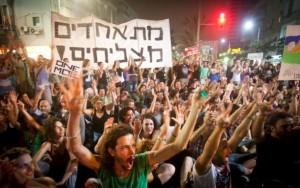The summer of our discontent
The 2012 protest got off to a bad start. The season's first rallies were poorly publicized and covered, but the next round included violent confrontations, and the coverage was lethal. The police got a black eye in the press from the brutality used against Daphni Leef and her tent-builders, but the violence between police and demonstrators and a broken bank window at a rally the following night provided the tabloids with ammunition to smear the protest.
The Likud trio of Ofir Akunis, Danny Danon and Miri Regev blasted the protesters as violent anarchists, socialists and leftist agitators, and with the exception of this newspaper, headlines picked up their alarmist, delegitimizing language; the protest was allegedly out of control, and had become both a dangerous and a fringe phenomenon. As for the police, their extremely polite and hands-off behavior at the demonstration the following week showed how easily they could prevent conflict when ordered to do so.
Perhaps most damaging of all, the inaccurate claim that the 2011 protest had failed, that nothing had changed since last summer, was allowed to go unchallenged.
In fact, the influence of last year's protest has been enormous. The entire economic discourse has changed, and new government policy decisions are increasingly measured by citizens, politicians and the media according to their impact on the middle class and their relationship to the social protest agenda.
And the protest itself has morphed, with the field of engagement relocated from rallies to dozens of smaller frameworks: the Periphery Forum and local "labs" working on municipal policy issues; the Coalition for Affordable Housing; and the Social Guard, who promote transparency by daily monitoring of Knesset activity. Private citizens used to accepting economic policies as divine edicts are now attempting to influence the shape of the next national budget.
Netanyahu's recent tax edicts show his continued willingness to burden the middle class and reluctance to challenge the ultra-Orthodox, settlers or the fiscal elite. But there have been concrete victories that would have been inconceivable in June 2011: free preschool education from age 3; postponement of planned tax cuts for the rich; promises to increase the stock of affordable and public housing; and new protest campaigns, such as those of young Ethiopians against racist housing practices and discrimination.
Some protest leaders, frustrated that only a small portion of their agenda had been implemented since last year, or seeking to use anger to fuel this summer's protest, reinforced the mistaken message of failure. This was a tactical error. Every community organizer knows that you build on small "wins" to get to bigger "wins," and you turn setbacks into challenges to motivate your base to greater activity. Who wants to be part of a movement that failed? Internal fragmentation among the young leaders - miraculously absent last summer - along with a poor launch plan in 2012 didn't help.
The uncomfortable merger of the campaign against draft exemptions for the ultra-Orthodox with the social protest agenda at last Saturday's clashing rallies in Tel Aviv exposed in an ugly way the common phenomenon of the battle over message control between different activist factions, but for now, the masses are staying home. And no one else has stepped up to assume command.
It is impossible to know how many potential protesters bought into the message of failure or at a critical moment were turned off by negative media images of the protest this summer, and how many had already lost interest. But powerful forces felt threatened and worked together to thwart the will of a great many citizens.
We must resist the lie that the largest protests in Israel's history was not successful, whether by making corporate interests bend to boycotts or political leaders pay at the ballot box. We can't afford to sit on our hands and watch our leaders drag us further into the abyss.
By Don Futterman
Don Futterman is program director for Israel of the Moriah Fund, a private American foundation that supports the Coalition for Affordable Housing, the Social Guard, Shatil, and other NGOs working for social and economic justice in Israel.

